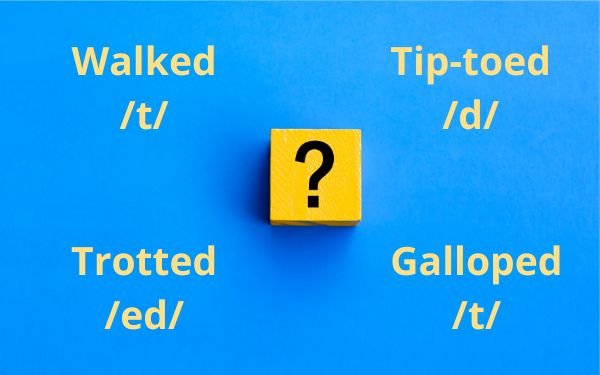One problem many English students have is not knowing how to pronounce the -ed sound at the end of regular verbs in the past.
Though verbs such as missed, closed and counted all end with the letters -ed, they are not pronounced the same way at all. The -ed in missed is pronounced /t/, in closed it is pronounced /d/ and in counted it is pronounced /ed/.
This can be a bit tricky and, if you want to master the basics of the English language, you will need to know how to properly pronounce regular verbs in the past.
The good news? It’s not that hard.
The rules related to the pronunciation of regular verbs in the past are pretty straightforward and there are no exceptions.
So, ready to start pronouncing regular verbs in the past correctly from now on, without any mistakes or hesitations? Then let’s get started!
The Ways of Pronouncing Regular Verbs in the Past in English

There are only three ways of pronouncing regular verbs in the past in English:
1. The -ed at the end of the verb is pronounced /d/
Example: “We closed the door.”
Here, “closed” is pronounced /k+low+zd/ (not /k+low+zid/ or /c+low+zt/)
2. The -ed at the end of the verb is pronounced /t/
Example: “I missed the bus.”
Unlike “closed”, “missed” is pronounced /miss+t/ (not /miss+ed/ or /miss+d/)
3. The -ed at the end of the verb is pronounced /ed/
Example: “I counted the books on the shelf.”
Now that you know the three only ways you can pronounce regular verbs in the past in English, the only remaining difficulty is to know when to pronounce past regular verbs /-d/, /-t/ or /-ed/, but there are clear rules to help you with this. Let’s look at them now.
The 3 Main Rules to Help you Pronounce Regular Verbs in the Past

Rule 1 is the easiest and most useful rule:
Regular verbs ending with a -t (accept) or -te (unite) or -d (afford) or -de (divide) will always be pronounced /ed/ in the past.
Examples:
- Detected is pronounced /de+tech+ted/
- Recited is pronounced /ree+sigh+ted/
- Avoided is pronounced /ah+void+ed/
- Collided is pronounced /co+lie+ded/
Rule 2 is a bit more complex, but you can memorize it quite easily:
Regular verbs ending with -ss (cross), -ch (watch), -sh (wish), -p (pop), -k (work), -f (puff) or -x (relax) will always be pronounced /t/ in the past.
Examples:
- Passed is pronounced /past/
- Matched is pronounced /mat+cht/
- Finished is pronounced /fi+nisht/
- Clapped is pronounced /clapt/
- Attack is pronounced /ah+tackt/
- Sniffed is pronounced /snifft/
- Mixed is pronounced /mixt/
Rule 3 is similar to Rule 2 and just needs a bit of practice and memorization:
Regular verbs ending with -se or -ze (apologise/apologize), -l or -ll (boil or roll), -ve (arrive), -n or -ne (turn or tone), -m (warm), -r (appear), -b (rub), -g (hug), -w (allow), -y (play), or -z (buzz) will always be pronounced /d/ in the past.
Examples:
- Organised/Organized is pronounced /organ+eye+zd/
- Toiled is pronounced /toy+ld/
- Called is pronounced /call+d/
- Lived is pronounced /liv+d/
- Happened is pronounced /ha+pen+d/
- Seemed is pronounced /sea+md/
- Remembered is pronounced /ree+member+d/
- Robbed is pronounced /raw+bd/
- Hanged is pronounced /hang+d/
- Borrow is pronounced /boh+row+d/
- Prayed is pronounced /pray+d/
- Quizzed is pronounced /kwiz+d/
Good Chart Summarizing the Main Rules on how to Pronounce Regular Verbs
| -ed verbs pronounced /t/ | -ed verbs pronounced /d/ | -ed verbs pronounced /ed/ |
| with letters:
p-k-ss-ch-sh-f-x |
with letters:
l-ll-ve-se-ze-n-m-r-b-ge-w-y-ze |
with letters:
t-d-te-de |
Ex:
|
Ex:
|
Ex:
|
Conclusion
English learners often make mistakes when pronouncing regular verbs in the past. These mistakes can easily be corrected thanks to the set of rules we have previously seen in this article.
All regular verbs in English can be divided into three categories which are pronounced either /t/, /d/ or /ed/. This depends on the ending of the verb.
To know how every regular verb is pronounced in English, you simply need to (re)read the 3 rules stated in this article or check out the recap chart above which summarizes the main rules and examples in a simple chart.
All clear? Then let’s check your understanding with a little test!
Quiz time!

Read this paragraph on the history of civil rights in the United States and answer the 10 questions below:
In 1954, America was still a society segregated along racial lines. Even schools were divided into those catering to either white or colored students. Oliver Brown of Kansas believed it to be in violation of his 14th Amendment right to Equal Protection. He brought a case against the Board of Education to the court. White segregationists argued that, while they may go to different schools, the fact that they have similar buildings, accessibility and subjects mean that colored students were getting an education equal to that received by white students; separate but equal, in other words. The plaintiffs contended, however, that the fact that it was separated meant that there was a difference and unless remedied, they would never be equal. The Supreme Court sided with Brown and declared school segregation as unconstitutional and to be banished in the whole country.
Questions:
That’s all for now. I hope this article will help you improve the way you pronounce regular verbs in English in the future.
Good luck and keep on practicing!

This article was written by Break Into English co-founder, Jeremy Ergas








